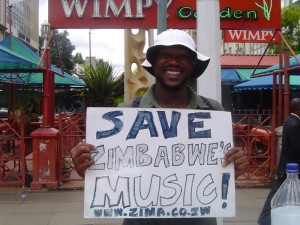Zanu PF: too scared to reflect
Wednesday, March 24th, 2010 by Upenyu Makoni-MuchemwaZimRights Director, Mr. Okay Machisa was arrested yesterday, Tuesday 23 March 2010 at Gallery Delta. He was in the process of finalising arrangements for the launch of an art exhibition entitled ‘/Reflections’/. Following the intervention by Zimbabwe Lawyers for Human Rights Mr. Okay Machisa was released from Harare Central Police Station.
At a press conference today, Irene Petras, Director of Zimbabwe Lawyers for Human Rights, described the conditions for Mr. Machisa’s arrest and the holding of the photographs in the following press statement:
The Officer Commanding Harare Central District, *Chief Superintendent G Gwangava,* advised that he had ‘/not approved’/ the launch and gave Mr. Machisa seven days to provide ‘/letters of consent from individuals and organisations’/ appearing in the photographs, failing which he threatened to prefer unspecified criminal charges against Mr. Machisa.
It is ZLHR’s considered legal opinion that the seizure and retention of the photographs by the police is unlawful and unjustifiable, as are the threats of criminal prosecution and the attempts to prevent the invitation-only launch from proceeding.
Such actions are solely calculated to instil fear and paralysis within civil society and to prevent free assembly, association and expression around national events and processes. For too long, civil society has been excluded by political parties and state institutions and actors from participating – as is its fundamental right – in issues around governance, national healing and reconciliation, and other matters which are in the national interest.
For this reason, ZLHR has been instructed by ZimRights to file – and has indeed filed – an Urgent Chamber Application demanding the immediate return of the photographs. The application also challenges the unjustifiable attempt to prevent the launch from taking place today, and the threats to prefer criminal charges, which, in our considered legal opinion, have no basis in law.
Mr. MacDonald Lewanika, co-ordinator for Crisis in Zimbabwe Coalition expressed civic society’s concern regarding the unlawful arrest and harassment of civic activists by state security agents. These actions have escalated in the last few months. Other ZimRights officials as well as Mr. Machisa have received threats via cell phone and email. In addition, the Secretary General of the General Agriculture and plantation Workers Union of Zimbabwe has also recently experienced harassment and intimidation from state agents. Mr Lewanika stressed that this behaviour was unwarranted and unjustifiable. Crisis In Zimbabwe Coalition is working to bring these matters to the attention of the mediators in the dialogue process around Zimbabwe’s political agreement, including President of South Africa Jacob Zuma. When asked about engaging the Ministers of Home Affairs in this issue he said:
“I think that the question of local remedies in Zimbabwe in situations like this, and this kind of behaviour by the police shows that as a place where you can run to [for protection] they are not an option. This idea of even engaging the Co-Ministers of Home Affairs Mr. Giles Mutsekwa and his counterpart Mr. Kembo Mohadi, is something that even while we do it, we think that that is no way for a country to operate. You can’t ask for ministerial intervention every time that something happens. It shows us that the problems we are trying to deal with are more fundamental than what we are looking at. Which is why this is important. The exhibition itself sought to raise the issues around the conduct of the police services. The police need to conduct themselves in a manner that ensures that such actions [intervention by high ranking members of government] are not necessary.”
ZHLR is currently waiting to hear from the Judge President, and has asked for the photos to be returned. The launch, which Prime Minister Morgan Tsvangirai is expected to attend, will go on as planned.



 A week ago
A week ago 





